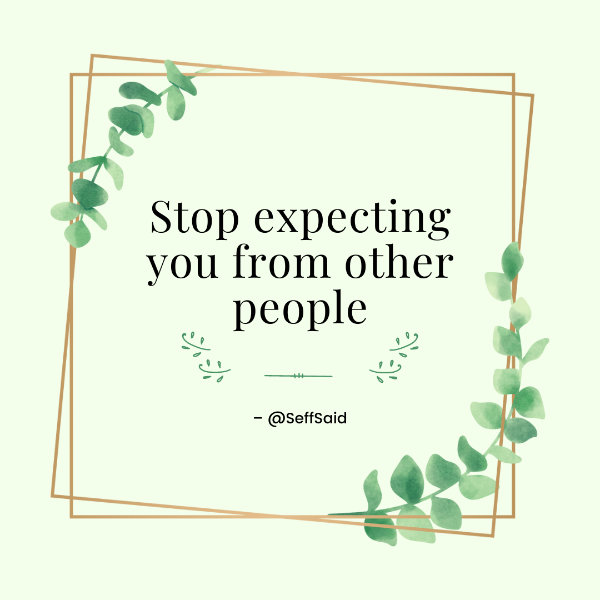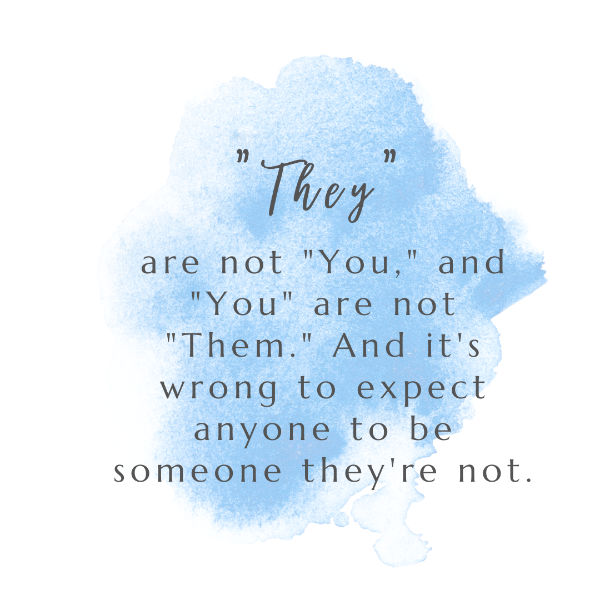How often do you look for yourself in other people? Rarely? In a few people? Literally every single soul you meet?
If you are anything like what I was a few years ago, you’d probably answer, “Literally every single soul I meet.” Why did I do it? I don’t know. Maybe I was too naive or immature for the world. Or maybe I had not met a lot of people. But whatever the cause may be, what I’m trying to say is that I was too judgemental. And that took a toll on every relationship I had at that time.
Luckily though, I was quick to realize that looking for myself in other people may not be the best way to traverse life. And that each individual is different and deserves to be treated that way. That journey taught me some vital life lessons. And I’ve condensed them into this article today.
But before we move forward, I want to mention a quote that helped me kickstart this journey,

> Feeling burnt out? Subscribe to my Everyday Self-Care Newsletter for self-care tips and doable habits that support your well-being.
“Stop expecting YOU from other people. It’s heartbreaking. Also, if you figure out how to do this, teach me.”
Steve Maraboli
“Stop expecting you from other people,” Meaning.
This was a quote that I stumbled upon accidentally while scrolling through Pinterest one day. And it had an immediate effect on me right when I saw it.
“Stop expecting you from other people” is a powerful phrase that reminds us to stop looking for ourselves in others and instead appreciate the unique qualities that make each person special. It’s a reminder that everyone is different, and that’s what makes them special.

“They” are not “You,” and “You” are not “Them.” And it’s wrong to expect anyone to be someone they’re not.
When we stop expecting ourselves in others, we’re less likely to be disappointed and are able to build stronger and more meaningful relationships. It’s like having a buffet of friends, each with different tastes and flavors, and you’ll enjoy them all differently. And who doesn’t want that?
The problem with expecting oneself in others
At some point in life, we’ve all been guilty of expecting ourselves in other people. Whether expecting our partner always to understand us, or our friends to always be available, we’ve all had those moments where we’ve put too much pressure on others to be like us. But the problem, as I already mentioned above, is that it’s not a fun ride.
Problem 1:
For starters, when we expect ourselves in others, we set ourselves up for disappointment. We’re putting pressure on others to be like us, and when they inevitably fall short, we’re left feeling let down. It’s like expecting a clown to be a rocket scientist, it’s just not going to happen, and it’s not fair to either party.
Problem 2:
Another problem with expecting ourselves in others is that it can lead to a lack of understanding and communication in relationships. When we expect others to think and feel the way we do, we’re not truly taking the time to understand their perspective. This can lead to misunderstandings and conflicts that could have been avoided if we had just taken the time to listen and understand.
Problem 3: The Worst Part
But the worst part is it can make you lose friends. When we expect others to be like us, we do not allow them to be themselves. And when they inevitably don’t live up to our expectations, we may push them away. Friendships are built on mutual understanding and respect, and when we don’t allow others to be themselves, we’re not building a strong foundation for a lasting friendship.
So, what’s the solution?
Well, it’s simple, stop expecting ourselves in others. Instead, try to understand and appreciate their differences.
Learn to communicate effectively and, most importantly, respect the boundaries of others. By doing this, we’ll not only have healthier relationships, but we’ll also be able to appreciate the unique qualities that make each person special.
The benefits of not expecting oneself in others
In the realm of relationships, not expecting oneself in others can be a game-changer. It’s like going from a bicycle to a motorcycle: You’ll never want to go back!
By not expecting ourselves in others, we open ourselves up to new experiences and perspectives, which can lead to some serious benefits.
For one, when we stop expecting ourselves in others, we’re less likely to be disappointed. Instead of expecting others to be like us, we’re allowing them to be themselves, and that’s where the magic happens. When we stop expecting others to be like us, we can appreciate their unique qualities, and that’s when relationships truly thrive.
Another benefit of not expecting oneself in others is that it leads to better communication and understanding. When we stop expecting others to think and feel like us, we’re more likely to take the time to truly listen and understand their perspective. This leads to fewer misunderstandings and conflicts and more meaningful conversations.
And let’s not forget, it can make you gain friends. When we stop expecting others to be like us, we’re allowing them to be themselves, and that’s when friendships truly flourish. By not expecting ourselves in others, we can build stronger and more meaningful relationships, and who doesn’t want that?
In addition to all that, when we stop expecting ourselves in others, it can also lead to increased self-awareness and self-acceptance. By not expecting others to be like us, we can see ourselves more clearly and accept our unique qualities, leading to a greater sense of self-worth.
How to stop expecting oneself in others
Okay, so we’ve established that expecting oneself in others is not a fun ride, and we’ve talked about the benefits of not doing so. But how do we actually put it into practice?
Well, my dear reader, it’s easier than you might think, and it’s definitely worth the effort.
Step 1:
The first step is to identify when you’re expecting yourself in others. This can be a little tricky, but with a little bit of self-reflection, you’ll be able to spot it. Ask yourself questions like “Am I expecting this person to think and feel like me?” or “Am I expecting this person to always be available when I need them?” If the answer is yes, then you’re expecting yourself in others.
Step 2:
Once you’ve identified when you’re expecting yourself in others, the next step is to set boundaries. This means setting limits on what you expect from others and what you’re willing to accept. For example, if you’re expecting your friends always to be available, you might set a boundary that you’re only going to reach out to them during certain hours.
Step 3:
Another key step is to practice self-reflection. By taking the time to reflect on your own thoughts and feelings, you’ll be able to better understand why you’re expecting yourself in others. This will help you to identify any underlying issues that might be driving this behavior and address them.
Meditation can be your greatest tool in this regard. Spending time in solitude is also another great way.
Step 4:
Finally, don’t be afraid to seek help if you’re struggling to stop expecting yourself in others. Whether it’s talking to a therapist or a trusted friend, having someone to talk to can make all the difference.
So, TLDR, stopping expecting oneself in others is not as hard as you might think. It starts with identifying when you’re doing it, setting boundaries, practicing self-reflection, and seeking help.
By following these steps, you’ll be able to build healthier and more meaningful relationships and live a more fulfilling life. So, let’s put the brakes on our expectations in others and start enjoying the journey!
“This article was contributed by Success Minded. They are a growth-minded community committed to personal growth and personal wellness. Find out about their latest articles here and on their Twitter profile.
Success Minded – Helping you become your best self.


